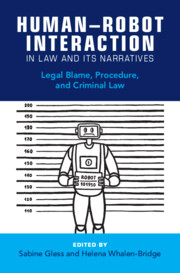Book contents
- Frontmatter
- Dedication
- Contents
- Contributors
- Foreword
- Acknowledgments
- Table of Cases
- Table of Statutes
- Table of Council of Europe Instruments
- Table of Other Council of Europe Materials
- Table of European Union Instruments
- Table of Other European Union Materials
- Table of Other Materials
- Abbreviations
- Introduction
- Part I Human–Robot Interactions and Substantive Law
- Part II Human–Robot Interactions and Procedural Law
- Part III Human–Robot Interactions and Legal Narrative
- 12 Narrative Approaches to Human–Robot Interaction and the Law
- 13 The Case of the Stupid Robot
- 14 Inevitable or Not?
- 15 “The Knowledge of Causes and the Secret Motions of Things”
- Index
14 - Inevitable or Not?
Narrative Arguments Regarding Autonomous Vehicles in Singapore
from Part III - Human–Robot Interactions and Legal Narrative
Published online by Cambridge University Press: 03 October 2024
- Frontmatter
- Dedication
- Contents
- Contributors
- Foreword
- Acknowledgments
- Table of Cases
- Table of Statutes
- Table of Council of Europe Instruments
- Table of Other Council of Europe Materials
- Table of European Union Instruments
- Table of Other European Union Materials
- Table of Other Materials
- Abbreviations
- Introduction
- Part I Human–Robot Interactions and Substantive Law
- Part II Human–Robot Interactions and Procedural Law
- Part III Human–Robot Interactions and Legal Narrative
- 12 Narrative Approaches to Human–Robot Interaction and the Law
- 13 The Case of the Stupid Robot
- 14 Inevitable or Not?
- 15 “The Knowledge of Causes and the Secret Motions of Things”
- Index
Summary
In Singapore, residents have expressed concerns about the safety of autonomous vehicles. This chapter considers the case of Singapore, which has supported the development of autonomous vehicles and tested their use. Using research studies and newspaper reports, the chapter examines the rhetorical devices used to frame relevant discussion and identifies the narrative arguments used to reduce fears and justify the presence of vehicles on public streets. The narratives of government and commercial entities complement each other and are frequently upbeat, but they differ in that commercial entities asserted the narrative that autonomous vehicles were inevitable, while government entities did not. The government’s rejection of inevitability supports a different view of law and government, in which government officials decide the degree and pace of AV development. However, Singapore has not adopted a strict regulatory approach, and opted instead for light touch regulation. As a narrative argument, rejection of inevitability does not dictate regulatory approach.
- Type
- Chapter
- Information
- Human–Robot Interaction in Law and Its NarrativesLegal Blame, Procedure, and Criminal Law, pp. 311 - 334Publisher: Cambridge University PressPrint publication year: 2024
- Creative Commons
- This content is Open Access and distributed under the terms of the Creative Commons Attribution licence CC-BY-NC 4.0 https://creativecommons.org/cclicenses/

